1. Truth and Relativity
2. True for me, true for you
3. Truth, Value and Morality
4. Belief, Justification, and Truth
5. Justification without Arguments
6. Knowledge
7. Justification Failure
8. Knowledge and Rational Persuasiveness
9. Philosophical Directions
① Scorpios tend to be luckier than Libras.
② It is true that Scorpios tend to be luckier than Libras.
③ It is true for Julie that Scorpios tend to be luckier than Libras.
④ Julie believes that Scorpios tend to be luckier than Libras.
According to what we said about the word ‘true’ at the beginning of this chapter, ① and ② are necessarily equivalent. It is impossible for one of them to be true and the other false. However, according to the version of the relativity-myth, Julie’s utterance of ② is equivalent to ③, which is equivalent to ④. So according to myth, ② is equivalent to ④. But ④ is certainly not equivalent to ①. Thus, according to this version of myth, we would have to say that ② is not equivalent to ①. But that cannot be right, for that violates the actual, ordinary meaning of the word ‘true’.
There is no way to make satisfactory sense of the relativity-myth. So truth is not relative. Truth is objective, and the truth of a proposition is independent of our desiring or believing it to be true. To believe is to believe something to be true, but truth is not the same thing as belief. The aim of good reasoning and argument is to get at the truth, at the way the world is, irrespective of how people think or feel it to be.
3. Truth, Value and Morality
We may think the Values, which are central to moral issue, are relative to personal or cultural preferences because of the relativity of truth. However, the non-relativity of truth does not imply the non-relativity of value. It is easy to think disagreement over a value in this respect like that between Julie and John concerning chocolate versus vanilla ice cream. We cannot prove that moral relativism is false. But we can know that there is a good reason to resist moral relativism.
A terrible fascist regime murdered millions of people
On the grounds of race, religion or political beliefs.
Even simplistic relativist who desires to remain consistent with their relativist commitment would not insist the victims are nothing more than preferences. There can be truth of the matter and there can be different status. As we can see by this example it is possible to refute the relativist's moral arguments and to find a general principle that the relativist can accept.
4. Belief, Justification and Truth
There are four stances we can take towards a proposition. Believing it, not believing it, suspending judgement and not engaging with it. We may suspend judgement, because we find upon reflection that we lack sufficient evidence to make the judgement. This happens when we lack an argument either for or against the proposition that is rationally persuasive for us.
The world was created by an omnipotent and omniscient being.
Some people believe the proposition, others disbelieve it. And others are not sure whether or not to believe it. They have suspended judgement until they acquire sufficient evidence to support a belief in either way. However, we have to carefully designate suspended judgment. For example, when the children do not believe that proposition, it would not be accurate to say that they have suspended judgement. They would not have considered the issue or could not understand the claim, in reality.
There would be the case like we can make judgment although we have never heard of it or simply don't care about it. An argument, which assumes that someone who does not believe a proposition is the same that someone believes its negation, commits a version of the epistemic fallacy.
A belief of being true is a matter of its fitting the facts, not a

- 오늘 본 자료가 없습니다.
- [자원봉사론] 작성자 거주지역의 자원봉사활동에 대한 현재 현황 등을 파악하고 분석 자원봉사자 모집의 활성화 방안
- 아동 복지에서 아동 학대의 대응방안에 대해서 작성 제출하시오
- 청소년 개별상담의 이론과 기법으로 인간중심 상담, 형태주의 상담, 현실치료 가운데 본인이 선호하는 상담접근 방법을 한가지 선택하여 주요개념 및 상담과정과 기술을 정리하시오
- 4주차 2차시에서 청소년기의 발달적 특성 중 자아정체감에 대하여 학습하였습니다 청소년기의 발달에서 반드시 획득하여야 하는 개념이 자아정체감임에도 불구하고 우리 사회에서는 학업과 같은 사회문화적 요소에 의하여 자아정체감 확립될 기회가 부재하여 청소년들이 어려움을 경험하고 있습니다
- 유엔아동권리협약의 4대원칙과 4대권리에 대해 정리하고 실제 아동권리가 보장되고 있는 경우와 침해되는 사례들을 들어 견해를 쓰세요
해당 정보 및 게시물의 저작권과 기타 법적 책임은 자료 등록자에게 있습니다. 위 정보 및 게시물 내용의 불법적 이용,무단 전재·배포는 금지되어 있습니다. 저작권침해, 명예훼손 등 분쟁요소 발견 시 고객센터에 신고해 주시기 바랍니다.



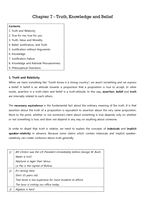
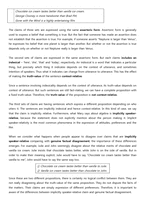
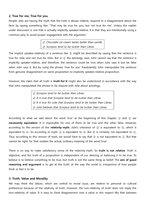
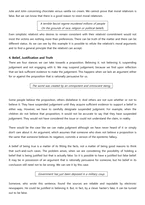
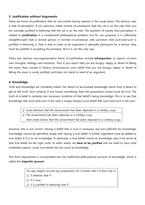
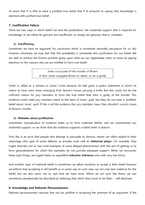
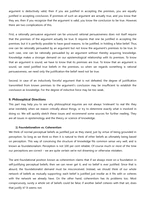
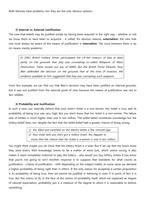
 분야
분야

